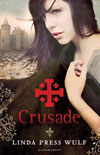When a surprise copy of Crusade arrived for review from Bloomsbury arrived through my door, I was very excited as it sounded just up my street. Before, I hadn’t read any fiction about the Crusades or the Children’s Crusade but I learnt about them at school so I was eager to read the author’s interpretation of these events.
Crusade tells the story of one of many Children’s Crusade through the eyes of fictional characters Georgette and Robert, two very different young teenagers who are united on a quest to reach the Holy land. Robert is an orphan who was left on the church steps as a baby but he never stole food like the other orphans in his village. As he grows older, it became apparent that he is extraordinarily intelligent and by the time he is five years old he knows all the Latin prayers and hymns by heart. The Church Abbot notices his talent and takes him in as the Abbey’s ward to be taught as his protege student. Georgette is a peasant girl whose mother died in childbirth. Finding her home life dull, she befriends the elderly village priest who teaches her more about her faith. When a young thirteen year old prophet who is no older than herself arrives in Georgette’s village looking for new children to she is drawn to the prospect of seeking glory for God, unlike many of the other children who just want a chance to travel and see the world. Along with her brother, who is known for his fiery temper, she leaves her village and everything she has ever known along to join the Crusade.
Later in the journey, when the Crusade stops at Robert’s abbey to ask for food, Robert joins too. He has become dissatisfied with his life in the Abbey where everything is governed by routine and the Abbot and wants a different life purpose.
The journey is more difficult than expected and the children must face every hardship imaginable from starvation and sickness to death. For months, they must rely on the kindness and goodwill of the inhabitants of passing villages, towns and cities but with thousands of children with empty stomachs, food becomes extremely scarce and Georgette and Robert have no way of knowing when their next meal will be. The things that they had to endure are heart wrenching and emotional to read about because many of the children are very young at only eight. I am glad that the author did not try to shy away from the realities of what the Children’s Crusade would have been like.
They were both really likable and strong characters and my heart went out to them in their struggles as they were very easy to warm and relate to. What I loved most about them was how despite all the terrible things that are happening around them and the realisation that the Crusade isn’t as focused on their holy mission as they first thought, they both remained true to their beliefs and faith.
I really liked how the story was told from the point of view of a boy and a girl, especially as it makes the story more appealing to both genders. It was also really clever how the stories of Georgette and Robert began to come together and entwine towards the end. However, my only disappointment was when the book came to an end when their story together began to pick up. It did pick up all of the loose ends but it also left a lot to the imagination so if the author wanted to, there is room for a sequel.
I learnt a lot about the Children’s Crusade through this fictional retelling of events and found the fate of these children very interesting. I think that it has just the right amount of action and history for younger readers to enjoy the story too and learn more about the Crusades must have been like by following the story of characters near their own age who it is easier to relate to.
Verdict: Linda Press Wulf has created a wonderful and beautifully evocative story based loosely on what little is known about the events of the Children’s Crusade. I really recommend it!

